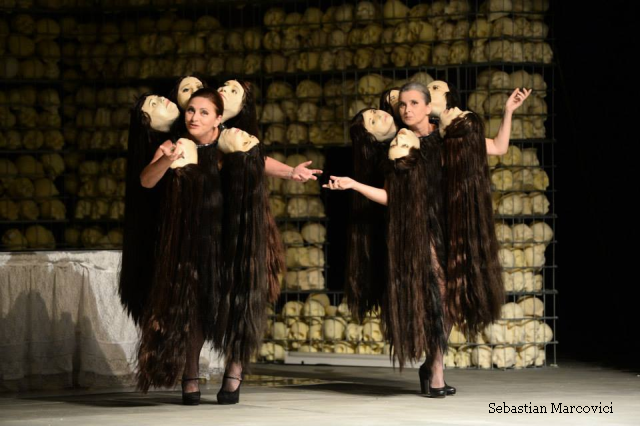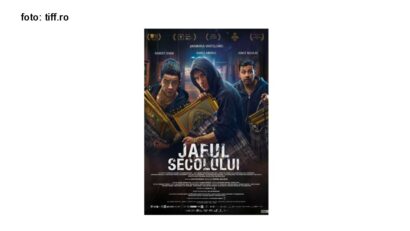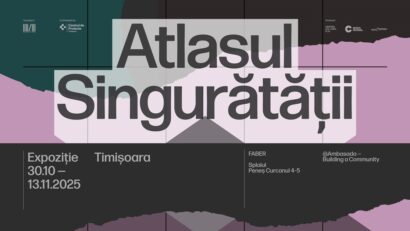Sibiu’s ”Radu Stanca” National Theater in the 2014-2015 season
Sibius Radu Stanca National Theater in the 2014-2015 season

Luana Pleşea, 18.10.2014, 15:29
It’s already a tradition, for some of Romania’s national theaters, to present some of their premieres before the start of the theatre season. The “Radu Stanca” National Theater in Sibiu, the organizer of the famous International Theatre Festival, did just that, in early October. Theatre lovers, critics and journalists alike were invited to see the first five premieres, out the total fourteen that make up Sibiu’s 2014-2015 theatre season.
This micro season started with the opening of a photo exhibition dubbed FOCUS TNRS: ”Visions of Revolt and Tragedy”, by Sebastian Marcovici and Dragos Dumitru. The two young photographers displayed an insider’s view of the five new productions staged this autumn.
Sebastian Marcovici: ”We used 30 photos for the exhibition, a set of six for each performance. We use our own panels for their display, the panels of the Focus Sibiu Association. Each set is made up of photos that are representative for every particular show. From my point of view, the key element when taking pictures of a staged play is to watch understand and feel the show. That is exactly why on stage photography is among my favorites. It is a challenge to feel the show, visualize it and take pictures of it, all in just one hour. The shows are very good, very visual, vividly colored, very dynamic and with a huge potential for some extraordinary photos.”
The series of premieres presented in early October was inaugurated by “Marat/Sade”, directed by Charles Muller of Luxembourg, an adaptation after Peter Weiss’s play “The Persecution and Assassination of Jean-Paul Marat as Performed by the Inmates of the Asylum of Charenton Under the Direction of the Marquis de Sade”, written in 1963. The renowned British director Peter Brook staged this play, in London in 1964, and on Broadway in 1965. Peter Brook later turned it into film script in 1966. Peter Weiss won a Tony Award for best play in 1966 while Peter Brook received the Best Director Award. Locked up in the Charenton mental hospital, the Marquis de Sade staged a play about the last days of Jean Paul-Marat, one of the most radical writers and politicians of the French Revolution, with the patients and political convicts confined in the asylum. This is, in short the play’s storyline. Charles Muller believes the text of the play is still very fresh.
The German section of Radu Stanca National Theatre has brought out a premiere – Peter Shaffer’s Amadeus, directed by Gavriil Pinte. The plot is about the life of Mozart, whose mysterious death was amplified by the rivalry between him and Salieri, initially believed to be the most talented composer at the Austrian Emperor’s court. But mystery was not of great consequence for director Gavriil Pinte.
Gavriil Pinte: ”I wasn’t particularly interested in that aspect, but the fact that the artist often fell prey to political and economic constraints — as we are today, not as much ideologically as economically — is of great notoriety and inherent in this issue. Mozart faced misery and poverty, the obtuseness of those who were supposed to support him financially and socially. We cannot tackle the condition of an artist and leave aside the social and political component just the way we cannot simply sidestep the aesthetic aspect. Mozart was a cut above the rest of his contemporaries. And I mainly focused on the artist’s condition, on this dramatic dialogue between a mediocre artist and a genius, between Mozart and Salieri. It’s about the agony and ecstasy of creation with Mozart and about the misery of mediocrity and sheer envy in Salieri — the only one able to fully understand Mozart’s music and the one who hated it the most.”
In this mini-season in Sibiu, the series of premieres continued with Eugen Ionesco’s ‘The Lesson’, directed by Mihai Manutiu, a very strong political text about manipulation, ‘Why Hecuba?’, by Matei Visniec, directed by Anca Bradu, a modern tragedy about Trojan queen Hecuba, and ‘Oidip’, directed by Silviu Purcarete and written by him based on ‘Oedipus Rex’ and ‘Oedipus at Colonus’ by Sophocles. This show was also present at this year’s edition of the International Theatre Festival in Sibiu, and will be staged at this year’s National Theatre Festival. In April 2015 it is going to be presented in Tokyo.






























